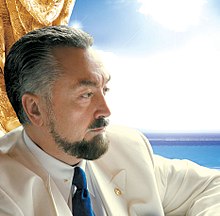Adnan Oktar
| Adnan Oktar | |
|---|---|
 |
|
| Born |
Adnan Oktar February 2, 1956 Ankara, Turkey |
| Residence | Turkey |
| Other names | Harun Yahya. Adnan Hoca |
| Occupation | Author |
| Known for | Islamic creationism, opposition to evolution (anti-Darwinism), Anti-Zionism, Anti-Masonry |
| Website | www |
Adnan Oktar (born 2 February 1956), also known as Harun Yahya, is a Turkish author as well as an Islamic creationist. In 2007, he sent thousands of unsolicited copies of his book, The Atlas of Creation, which advocates Islamic creationism, to American scientists, members of Congress, and science museums. Oktar runs two organizations of which he is also the Honorary President: Bilim Araştırma Vakfı (literally, "Science Research Foundation", BAV, established 1990), which promotes creationism and Milli Değerleri Koruma Vakfı (literally, "National Values Preservation Foundation", established 1995) which works domestically on a variety of moral issues.
In more recent years, Adnan Oktar has been known for his televangelism on his TV channel, A9 TV, noted especially for featuring 'kittens', his female devotees. His organization is commonly referred to as a cult, and he has been described as the "most notorious cult leader in Turkey." Oktar filed more than 5000 lawsuits against individuals for defamation in the last decade, which led to the blocking of a number of prominent websites in Turkey.
Adnan Oktar was born in Ankara, Turkey, in 1956, and raised there through his high school years, where he studied the works of Islamic scholars like Said Nursi, a Muslim Kurdish scholar who wrote Risale-i Nur, an extensive Qur'anic commentary which includes a comprehensive political and religious ideology.
In 1979, Oktar came to Istanbul and entered Mimar Sinan University. These years were marked with violence and repression which led to the installation of a military junta following the coup of September 1980. The environment in Turkey was one of political and cultural instability, threatened by Cold War politics, and a clash between Kemalist secular modernisers and a rising tide of Islamic militancy. In this environment he regularly attended the Molla Mosque in Fındıklı locality, close to the academy of fine arts where he studied interior architecture, to pray regardless of threats.Edip Yuksel, who knew him during those years, described him as a "Sunni zealot."
...
Wikipedia
